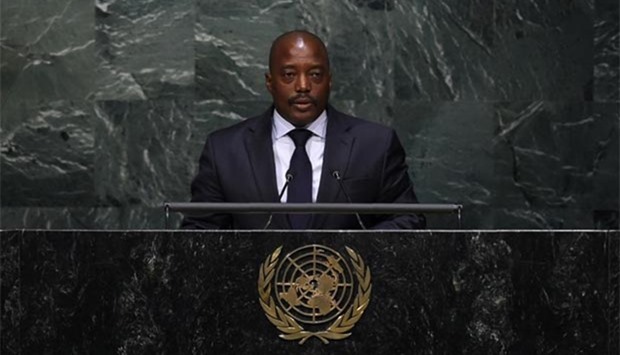At least 40 people have been killed and another 460 arrested in the Democratic Republic of Congo this week during protests against President Joseph Kabila's refusal to leave office, the UN said on Friday.
"The UN Joint Human Rights Office in the DRC (UNJHRO) has documented at least 40 killings of civilians in Kinshasa, Lubumbashi, Boma and Matadi," the United Nations human rights office said in Geneva.
Those killed were "mainly" people protesting against Kabila's refusal to step down after his second and final term, which officially ended on December 20, rights office spokeswoman Liz Throssell told reporters.
"Some 107 people have been injured or ill-treated and there have been at least 460 arrests," she added.
In a statement, UN rights chief Zeid Ra'ad Al Hussein said the high casualty figures suggested DR Congo's security services had shown "a serious disregard" for the need for restraint.
"Not only are soldiers participating in law enforcement operations, but all the forces involved are heavily armed and using live ammunition," Zeid said.
Chronically-unstable DR Congo has been thrust into political limbo by Kabila's refusal to quit the presidency.
Hopes were raised on Thursday that deal between the government and opposition brokered by the influential Catholic church could be signed imminently, but a source close to the negotiations said on Friday that "complications" were holding up a final agreement.
Zeid warned that the political crisis could be leading to "wider destabilisation" across the country.
"Violent repression of dissenting voices and a heavy-handed and irresponsible response to demonstrations risk provoking violence in return by demonstrators and possibly even tipping the constitutional crisis over the president's future into further conflict across the country," the rights chief said.
Meanwhile, Congolese politicians have agreed in principle to a deal under which President Kabila leaves office by the end of 2017, opposition leaders said on Friday, an unexpected breakthrough after dozens were killed in anti-government protests this week.
In return, the constitution cannot be changed to let Kabila stand for a third term, a prime minister will be named from the main opposition bloc and its leader Etienne Tshisekedi will oversee the implementation of the deal, Martin Fayulu and Jose Endundo told Reuters.
"Kabila stays for one year," Fayulu said. "He will not try to stand for a new term."
A government spokesman declined to comment on the specifics of the deal, which requires final approval by all the delegates at negotiations mediated by Democratic Republic of Congo's (DRC) Catholic Church.
Jean Marc Kabund, the secretary general of Congo's largest opposition party, the UDPS, warned that the deal was not yet a sure thing.
"Today is the last day (of negotiations)," he told Reuters. "It's make it or break it."
Kabila's mandate expired on Tuesday but he has remained in office as a presidential election scheduled for last month was postponed until at least April 2018 because of what the government said were delays registering voters.
He has declined to commit publicly to not changing the constitution, leading to accusations that he is trying to cling to power.
Kabila's allies have repeatedly argued that he is committed to respecting the constitution but that promising to step down would make him a lame duck and possibly spark a power struggle that could put his life in danger.
His father, President Laurent Kabila, was assassinated by a bodyguard in 2001 and Congo has never had a peaceful transition of power.

Democratic Republic of the Congo President Joseph Kabila addressing the United Nations in this file picture.
